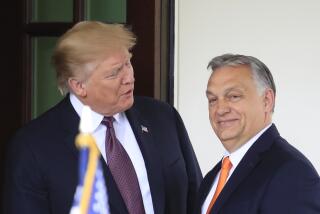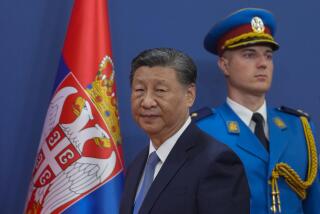Ortega, in Quest for Economic Aid, Starts Europe Tour
- Share via
MANAGUA, Nicaragua — President Daniel Ortega embarked on a three-week tour of 10 Western European countries Saturday in a major quest for economic aid.
Nicaraguan authorities said he will seek $250 million in assistance to halt the slide of an economy shattered by a war against the U.S.-backed Contras and to start modest reconstruction. Western Europe’s official aid to Nicaragua is now about $100 million a year.
The trip will test European attitudes toward Sandinista political reforms adopted under a Central American peace agreement. Ortega left a day after President Bush extended a four-year-old U.S. trade embargo against Nicaragua as a means of holding Managua to its promise of fair elections.
Before departing, Ortega summoned reporters to watch him sign an amended electoral law, as well as a new media law that eases censorship. Both were passed by the National Assembly last week to comply with the Feb. 14 peace accord, which calls for closing Contra camps in Honduras in return for free elections here next February.
“Nicaragua is meeting its end of the agreement,” Ortega declared. “But this effort requires international support. This is a good time for Europe to play a more active and aggressive role in Central America, to stimulate this peace plan and stimulate the United States to support it.”
Ortega accused Bush of acting against the peace accord by extending the trade embargo and pressing Honduras to allow the Contras to remain in their camps beyond the elections. “While we are trying to put out this fire, the North American government is throwing on more fuel,” he said.
European diplomats said they doubt Ortega will meet his trip’s financial goal but that he may succeed politically in opening new doors. They said that British Prime Minister Margaret Thatcher and West German Chancellor Helmut Kohl, whose governments long ago suspended aid to Nicaragua, have agreed to meet with Ortega for the first time.
Will Meet Mitterrand
Ortega is due to meet Monday with French President Francois Mitterrand. He is then to visit Belgium, Spain, Italy, Greece, West Germany, Britain, Ireland, Norway and Sweden.
Secretary of State James A. Baker III, on a visit to the Continent in February, urged West European leaders to tie their economic aid to Nicaragua’s advance toward democracy.
Besides seeking immediate financial support, Ortega will aim to soften U.S. policy indirectly, Sandinista officials said. They hope that Thatcher, especially, will see his commitment to free elections as sincere and persuade Washington to end its embargo.
“Thatcher has her rightist positions, but she is a person who likes dialogue,” said Foreign Minister Miguel D’Escoto, who is accompanying Ortega. “I have the highest hope that through dialogue with her, we can change the climate of incomprehension, which is a result of disinformation spread by the United States.”
Nicaragua is in a severe recession caused by the layoffs of more than 40,000 state employees in the past year. The austerity measures have slowed inflation that reached 36,000% in 1988 but have caused industrial production to shrink by 32%, according to Economy Minister Luis Carrion. He said that Nicaragua spent $800 million on imports last year while earning $250 million from exports.
“The country needs a great injection of capital to be able to think about reactivating the economy without falling again into the inflationary spiral,” he said in outlining the $250-million aid goal.
Clemence Rode, a West German who channels private German aid to Nicaragua, said he thinks that goal is unrealistic because many countries Ortega will visit already spend a large share of aid on Nicaragua.
“The figure will probably be closer to $100 million than $250 million, even if everything goes well,” he said.
He added that Ortega may also come home with additional trade credits, debt relief and a more favorable disposition toward loans to Nicaragua by the multilateral agencies.
Nicaragua is heavily dependent on foreign aid. Its main benefactor, the Soviet Union, gives about $300 million in non-military assistance a year. But Moscow’s refusal to increase its aid has obliged the Sandinistas to look to Western Europe.
Some of those countries, notably France and the Netherlands, have reduced aid to Nicaragua in recent years out of disillusionment with the Sandinistas’ political and economic performance.
Opposition leaders here said the electoral law amendments were rushed through the Sandinista-controlled assembly so Ortega could tout the changes in Europe as an advance. In the amendment process, nearly all of the opposition parties’ proposals were voted down, including one to give them equal power on a council that will oversee the elections. Fifteen opposition parties have threatened to boycott the race.
As the law stands, the Sandinistas will name all five council members. But Ortega pledged Saturday that two members will be opposition representatives and one a prominent Nicaraguan of “unquestionable impartiality.”
More to Read
Sign up for Essential California
The most important California stories and recommendations in your inbox every morning.
You may occasionally receive promotional content from the Los Angeles Times.













